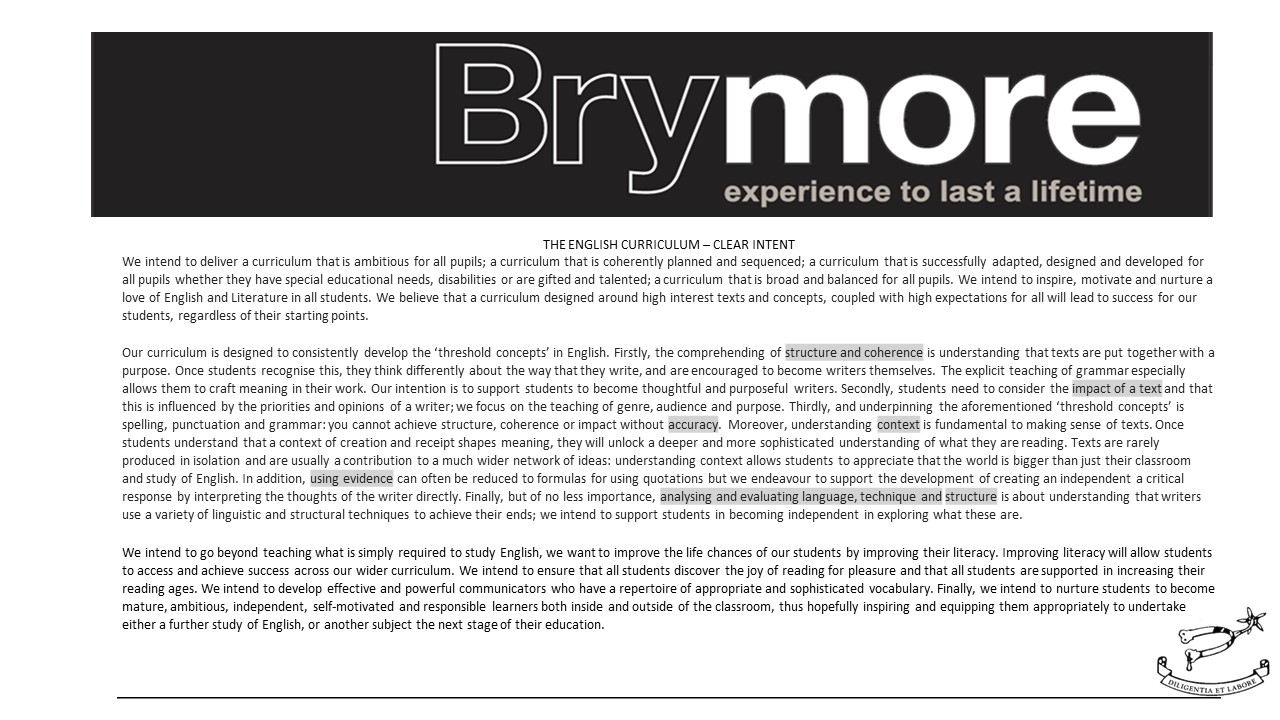Welcome to the Brymore English Department!
We pride ourselves on our record of ‘outstanding’ teaching. In 2015 Ofsted noted that ‘the teaching of English is consistently strong’ and the progress of students is ‘rapid’; in April 2018 Ofsted confirmed that ‘attainment is consistently good in English.’ We encourage boys to exceed expectations and achieve the best possible results. We encourage our students to think for themselves, to analyse language with originality and perception, to develop into confident, highly skilled critics. There are no barriers. Boys are expected to work hard and commit totally to all aspects of the course. In return, we aim to inspire, encourage and praise, because enjoyment breeds motivation, which in turn, breeds success.
‘Boys will achieve their full academic potential. What makes English at Brymore unique? The fact that in many cases, they will go beyond this.’
Opening Minds: Brymore English Focus Day
Key Stage 3
All schemes of work are designed to be engaging, challenging and rigorous in order to develop and refine skills in reading, writing and speaking and listening. Students in Year 7, 8 and 9 have dedicated reading lessons once a week where they have the opportunity to explore different works of fiction, read to staff and have the time to develop into skilled and confident readers: vital for success at key stage 4 and the rest of their adult lives. Students participate in the Accelerated Reader programme which ensures that students are reading material at the correct level to help them progress, tests their comprehension and closely monitors their progress. Reading for pleasure is at the heart of what we do and all students, regardless of ability, are expected to read and therefore contribute towards the annual inter-house reading competition. Students also have designated time within the English curriculum to study the Cambridge Latin course. With up to 60% of our language having Latin or Greek roots (a figure which rises to 90% when looking at technical language), this is a crucial part in developing their literacy and ensuring that their vocabulary is broadened significantly enough to help them achieve success across the curriculum and in future study. Key Stage 3 also places an emphasis on helping students develop the skills needed for independent study – time management, organisation, meeting deadlines etc. and are expected to complete half termly projects.
Year 7
In year 7 students will start by exploring the theme of conflict though different works of fiction, non-fiction and poetry. Students start to learn how to write analytically and critically from their analysis and evaluation of different writers’ use of language and structure. Alongside this, students study the popular contemporary novel ‘Private Peaceful’ by Michael Morpurgo. This is completed largely on their own, and students are charged with an independent study of the novel in their own time for their prep – encouraging the three Rs in their academic lessons. In the spring term the concept of identity is explored through a ‘Grammar for Writing’ unit. Students investigate the use of ‘alter egos’ in literature and explore how different grammatical constructions can transform their creative and imaginative writing. Following this, the theme of identity is continued through an introduction to Shakespeare and a study of the comedy ‘Much Ado About Nothing.’ After Easter students begin their study of gothic horror and end the summer term with another grammar for writing unit focussed on the natural world; they will become environmental warriors and learn the art of applying rhetoric to their writing
Year 8
In Year 8 students start the year with the theme of mystery, crime and espionage. They explore how writers use different grammatical conventions in spy fiction and aim to use these to create their very own spy story. This is then followed by a study of the 20th century drama ‘An Inspector Calls’ by JB Priestley. In the spring term students follow the theme of relationships through a study of ‘Romeo and Juliet’ and an anthology of poetry. In the summer term they investigate the theme of survival through fiction and non-fiction texts and end the year with an introduction to the Romantics exploring how the local area contributed to this literary movement.
Year 9
In year 9 students explore the 19th century in the autumn term. They will study a variety of extracts from 19th century fiction and non-fiction aimed at building their contextual knowledge of the period which will be needed for their exams in year 11. This is then followed by reading the classic Dickens novella ‘A Christmas Carol’ in the run up to the festive period. In the spring term we explore dystopian worlds. In the first half of the term, students analyse different extracts from dystopian fiction, analysing their grammatical construction with an aim to create their own piece of dystopian creative writing. This is followed by studying the classic allegorical work ‘Animal Farm’ by George Orwell. In the first half of the summer term we will specifically develop transactional writing, again through the study of grammar in a bid to turn our students into fully-fledged members of the press. After this, they end the year beginning the study of the poetry anthology for their GCSE course.
What will GCSE English be like?
At GCSE students study English Language and Literature with Edexcel. For Language students study a range of 19th, 20th and 21st century texts as well as developing their creative and transactional writing. For Literature students study the award-winning musical ‘Blood Brother’s’ by Willy Russell, Shakespeare’s most famous tragedy ‘Macbeth’, Robert Louis Stevenson’s ‘Jekyll and Hyde’ and an anthology of poetry exploring the theme of conflict.
Head of Department: Mrs V. Rogers





